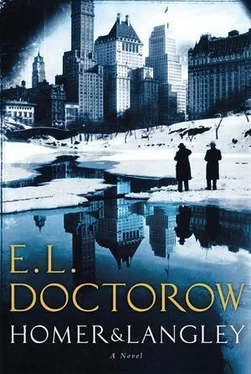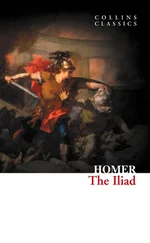LANGLEY DID NOT SCOFF at my claim to be able to see when I had had a few. You know, Homer, he said, among the philosophers there is endless debate as to whether we see the real world or only the world as it appears in our minds, which is not necessarily the same thing. So if that’s the case, if the real world is A, and what we see projected on our minds is B, and that’s the best we can hope for, then it’s not just your problem.Well, I said, maybe it’ll turn out I have eyes as good as anyone’s.Yes and maybe someday you, as you grow older and know more, have more experiences stored in your brain, you should be able to see in sobriety what now you see when plastered.Langley was convinced of this because it fit right in with his Theory of Replacements, which he had by now developed into a metaphysical sort of idea of the repetition or recurrence of life events, the same things happening over and over, especially given the proscribed limits of human intelligence, Homo sapiens being a specie that, in his words, just didn’t have enough. So that what you knew from the past could be applied to the present. My deductive visions were in accord with Langley’s major project, the collection of the daily papers with the ultimate aim of creating one day’s edition of a newspaper that could be read forevermore as sufficient to any day thereof.I will speak for a moment about this because while Langley had many projects, as befitting a mind as restless as his, this one endured. His interest never flagged from the very first day he went out to buy the morning papers to the end of his life when his newspaper bales and boxes of clippings rose from floor to ceiling in every room of our house.Langley’s project consisted of counting and filing news stories according to category: invasions, wars, mass murders, auto, train, and plane wrecks, love scandals, church scandals, robberies, murders, lynchings, rapes, political misdoings with a subhead of crooked elections, police misdeeds, gangland rubouts, investment scams, strikes, tenement fires, trials civil, trials criminal, and so on. There was a separate category for natural disasters such as epidemics, earthquakes, and hurricanes. I can’t remember what all the categories were. As he explained, eventually — he did not say when — he would have enough statistical evidence to narrow his findings to the kinds of events that were, by their frequency, seminal human behavior. He would then run further statistical comparisons until his order of templates was fixed so that he would know which stories should go on the front page, which on the second page, and so on. Photographs too had to be annotated and chosen for their typicality, but this, he acknowledged, was difficult. Maybe he wouldn’t use photographs. It was a huge enterprise and occupied him for several hours each day. He would run out for all the morning papers, and in the afternoon for the evening papers, and then there were the business papers, the sex gazettes, the freak sheets, the vaudeville papers, and so on. He wanted to fix American life finally in one edition, what he called Collyer’s eternally current dateless newspaper, the only newspaper anyone would ever need.For five cents, Langley said, the reader will have a portrait in newsprint of our life on earth. The stories will not have overly particular details as you find in ordinary daily rags, because the real news here is of the Universal Forms of which any particular detail would only be an example. The reader will always be up to date, and au courant with what is going on. He will be assured that he reads of indisputable truths of the day including that of his own impending death, which will be dutifully recorded as a number in the blank box on the last page under the heading Obituaries.Of course I was dubious about all of this. Who would want to buy such a newspaper? I couldn’t imagine a news story that assured you that something was happening but didn’t tell you where or when or to whom it was happening.My brother laughed. But Homer, he said, wouldn’t you spend a nickel for such a paper if you didn’t have to buy another ever again? I admit this would be bad for the fish business but we have to think always of the greatest good for the greatest number.What about sports? I said.Whatever the sport is, said Langley, someone wins and someone loses.What about art?If it is art, it will offend before it is revered. There are calls for its destruction and then the bidding begins.What if something comes along that has no precedent, I said. Where will your newspaper be then?Like what?Like Darwin’s Theory of Evolution. Like that Einstein fellow’s Theory of Relativity.Well you could say these theories replace the old ones. Albert Einstein replaces Newton, and Darwin replaces Genesis. Not that anything has been made clearer. But I’ll give you that both theories are unprecedented. What of it? What do we really know? If every question is answered so that we know everything there is to know about life and the universe, what then? What will be different? It will be like knowing how a combustion engine works. That’s all. The darkness will be there still.What darkness? I said.The deepest darkness. You know: the darkness deeper than any sea-dingle.Langley would never complete his newspaper project. I knew that and I’m sure he knew it as well. It was a crazy foolish hand-rubbing scheme that kept his mind in the mood he liked to be in. It seemed to give him the mental boost he needed to keep going — working on something that had no end other than to systematize his grim view of life. His energies sometimes seemed unnatural to me. As if he did all the things he did to keep himself among the living. Even so he would slip for days at a time into a discouraging lassitude. Discouraging to me, I mean. I would catch it sometimes. Nothing would seem to be worth doing and the house would be like a tomb.
NOR WAS THERE any true consolation to be had in the whores that none other than Vincent, the gangster with the squeaky voice, sent over one night as a present to me, his best blind friend. Jacqueline, you will have to forgive this: but you did tell me to be fearless and write what comes to mind. There they were at the door as our clocks struck midnight, two girls whose broad smiles I could hear, and with a big cake on a rolling table that the same driver who had brought us home a month before rattled into the hall, and a half dozen bottles of champagne packed in ice.It takes some drinking to dissolve the wariness that comes over one who is the recipient of a gift from a gangster. It wasn’t my birthday, first of all, and second of all, because some time had passed since the night we had met Vincent, what other inference was possible than that (a) we were now a pin on his map, and (b) without any choice in the matter we could be incurring some mysterious obligation.These ladies for their part seemed wary of us, or perhaps of our residence, Fifth Avenue on the outside and something of an aspiring warehouse on the inside. Langley and I sat them down in the music room and excused ourselves for a conference. Fortunately both Siobhan and Mrs. Robileaux were long since retired, so that was not the problem. The problem was that these professionals could not be turned away without offending a man of great and possibly murderous sensitivity. As we discussed this dilemma in the butler’s pantry I heard Langley putting champagne glasses on a tray and so it wasn’t to be that much of a conference after all.I will say in our defense that at this time we were still young men, relatively speaking, and deprived for some time of the male’s basic means of expression. And if this gesture by a man we hardly knew seemed menacingly excessive, there was such a thing as potlatch among indigenous tribes, a means of self-aggrandizement through the distribution of wealth, and who was this Vincent but a sort of tribal sachem determined to elevate himself in the opinions of others. And so we drank the champagne, which had the effect of erasing all thoughts not of the present moment. For this one night we were to arise from our gloom, recklessly relaxed and taken with the philosophical conviction that licentious life had something to say for it.And I’ll say this about the girl who came to my bed: she did not find it humiliating to be accompaniment to a three-layer cake and a bottle of champagne. And I knew the name she gave me was fictive. So I had some sense, once the giggling was over and the serious engagement began, that some achieved wisdom governed her life and that she lived apart from what she did for a living. She had grace, she was not vulgar. And the other thing was that she was very kind, and that the professional she was tended to disappear in the simple facts of a small female body. When afterward she kissed my eyes I almost wept with gratitude. After she was gone, when they both had gone and I heard their car driving off, I was fairly sure that Vincent, their employer, could not have known these whores as Langley and I did. It was as if they waxed or waned in their being according to who it was, of what quality of mind, who touched them.Langley said only about his encounter that it was finally meaningless, two strangers copulating, and one of them for money. He was not prepared to acknowledge our champagne-induced excitements. He was convinced that one way or another we would end up paying for my gangster friend’s generosity, and that we had not heard the last of him. I agreed, though with every passing year and no further word from Vincent the Gangster we would quite forget him. But at this time Langley’s presentiment seemed all too valid. So that by noon of the next day the tender emotions of my drunken self were unseated and my gloomy spirit had returned to its throne.
Читать дальше












